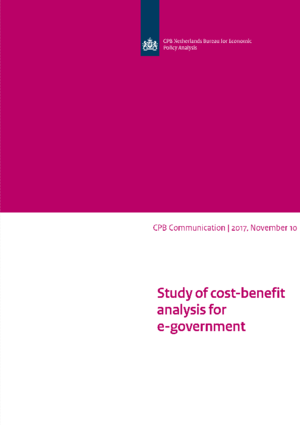Study of cost-benefit analysis for e-government
CBAs provide an overview of the welfare effects of a project or measure for society as a whole and can therefore help to substantiate policy choices. The CBA provides not only a go/no go decision, but is also useful as a reference framework or as a tool for project optimisation.
It is important to use a CBA early in the decision-making process and to make a proper problem analysis. A problem analysis ensures that the CBA looks at a solution that actually addresses the problem, it ensures that all possible solutions are identified, it clarifies the legitimacy of government intervention and indicates the government level that best corresponds to the scope of the problem.
A CBA must preferably monetise, or otherwise quantify or at least qualitatively describe the costs and benefits.
The CBA methodology can also be applied to projects surrounding e-government. CBAs are particularly applicable to projects that have broad economic effects. These may include improving services to citizens and businesses, improving the accessibility of public sector information or projects in which coordination problems are involved. For these types of projects, a CBA could be helpful in analysing the problem or opportunity in a structured manner and to map out the broader welfare effects for society as a whole.
Specific areas of attention regarding applicability of the CBA framework for e-government include (uncertain) technological development, effects on privacy, security and fraud, continued development of ICT services (management costs) and path dependency.
CBA handbook
A handbook is a useful tool for outlining a framework for the application of CBAs in the field of e-government. The handbook is the basis on which further experiences can be gained in carrying out CBAs in the field of e-government. The handbook must:
- emphasise the importance and timeliness of the problem analysis;
- pay attention to ways in which technological development can be taken into account as much as possible;
- indicate how the effects of a measure can be determined, used and interpreted as best as possible;
- develop impact assessment techniques (and valuation) for important issues for which little is known as of yet, such as security, fraud and privacy; and
- examine possible reasons for derogations from the real standard discount rate.
In addition, this memorandum includes the following guidelines. The first section deals with general guidelines. The second section deals specifically with e-government.
- A problem analysis must take place in the process as early as possible. A CBA without a problem analysis will not provide relevant answers. ICT is not an end in itself, but a means of solving or tackling a problem.
- The CBA takes into account the costs of path dependency and examines any variations that are less prone to path dependency. When drawing up a CBA, the ideas of adaptive management and real option analysis can be used.
- Significant benefits may go hand-in-hand with a high degree of uncertainty. The CBA must take this into account by specifying ranges.
- Scenarios would need to correspond as much as possible with the study on Welfare, Prosperity and Quality of the Living Environment [Toekomstverkenning Welvaart en Leefomgeving (WLO) (2015)]. To do this, additional assumptions need to be made regarding relevant ICT-related variables, in line with the WLO scenarios.
- One of the ways of doing this is to ensure there are CBA experts and independent ICT experts in an advisory group or monitoring committee or to organise expert meetings.
- Distributional aspects must take the digital divide into account: the difference between those who benefit from digital technology and those who cannot or will not.
